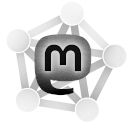Pen and paper have been with me my entire life. I started fancying fountain pens since high-school, weird for an Italian, we are not taught to use "la plume" like the French still do, nor I ever had a predilection for calligraphy (my handwriting in fact is fairly "write-only", perhaps a heritage from my father being a doctor, albeit, my lettering was never quite as bad as his).
That's not to say I am a paper maximalist, au contraire, I tried over the years all kinds of ways to replace it, but never quite found anything that really worked better.
I bought one of the first e-ink devices (Sony PRS 505), I remember using calibre scripts to section columns of research papers in order to better fit the small size of the screen.
I bought the first iPad, and iPads have been with me ever since, at a point I carried one more religiously than my phone.
 Currently writing this on my iPad pro.
Currently writing this on my iPad pro.Yet, nothing ever quite worked as well, for me, especially when it comes to my professional endeavours. I read a LOT of research work, I write a lot of ideas down too.
Reading, even with today's "retina" screens, was never quite as good. Contrast, resolution, glare, nothing works as well. Even weight and portability, the fact I can fold paper, I don't have to think about files, I can jot notes regardless of where I am.
Doesn't help that I like both reading and writing in fairly small print.
 Yeah...
Yeah...Writing is even worse.
I can still feel the lag even in modern e-ink, the "auto-smoothing", I don't quite love the feeling of screens and plastic pens quite as much...
It might all seem silly, minor things, but somehow (I'm sure there is plenty of research on the subject) it all comes together in such a way I notice I can't draw diagrams quite as well, straight lines become wobbly, in practice I don't function quite as well.
Not to mention I despise introducing more technology, and thus complexity, in my life. I have A LOT of crap, of all kinds, but at the same time I have a fairly high threshold for acquiring more crap (no IoT stuff in my house!).
I resell a lot as well, for the same reason - get to enjoy something for some years, but eventually I let go.
FWIW, same goes for keyboards and especially trackpads. I'm not really a keyboard person, in fact I have been writing on some variant of Apple aluminum's for almost two decades, which most keyboard aficionados would never even consider. But I also own a very loud mechanical (a low profile Kahil blue if U care), and I happen now to use daily at work a full travel topre, so really going from one end to the other of the tactility spectrum...
 NiZ Plum.
NiZ Plum.Everything works, if it works. It's a binary - hardware that works well for me, and hardware that makes my finger want to puke. Never found a non-apple trackpad that I could use for a reasonable amount of time. But even Apple is not without faults. There is a specific generation of mac air on which I could not type more than a few sentences, and of course, the magic mouse...
All this lengthy preamble just to pre-empt the usual "have you tried X", now we're ready to talk about pen and paper, and their role in my digital life :)
My way...
The path to happiness is to know yourself - someone must certainly have said at some point in time.
For anything non-trivial, there are no universal rules, lists of bullet-points, and suggestions that can be meaningful. It's all about tradeoffs, and what works in a context, in this case, the context being you.
My routine is personal, and the person exercising it is... complex.
It's not impossible that someone could categorize me with some traits of OCD or ADHD, I don't know...
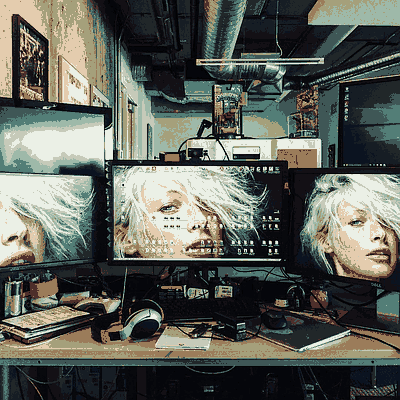 A vintage example of my desk. Definitely not neat!
A vintage example of my desk. Definitely not neat!I have no compulsions, in fact, I live a life that is far from sterile and orderly, my house, my office, my digital life - all messy! But I do enjoy making order, every weekend I take care of the house, our plants, our laundry and so on.
Similarly, I have no problems focusing and doing deep, hard work, but I have troubles starting, always preferring the width of learning to the depth of tinkering.
Lastly, I am creative, nothing in my possession does not become "customized" over time, almost in a horror vacui sense. I like making art, crafting, fixing things, I am a fairly accomplished photographer and so on... But at the same time, I know I tend to overanalyze - and that makes my art worse than it could be if it was more free.
I big trick I learned to play on myself is to find freedom in constraints, by imposing limitations, as a challenge or part of the problem, then I am better able to narrow down onto the practical work without feeling guilty that I did not explore the entire universe of possibilities in the search of an absolute global maximum.
Especially now that I have more freedom in my work, and it became almost entirely self-directed, not having had to contend for almost a decade now with the pressure of ship dates in AAA games.
Last thing that you have to know about me, pertinent to the matter, is that I am incredibly cloud-headed. As I'm getting older I actually have been improving a lot, I am now a competent adult that pays his taxes somewhat on time... But as a boy, you wouldn't believe. I could not remember anything, well... anything that did not matter to me.
Like, how much bread to buy, I would forget in the time it took to come down the elevator to the bakery that was literally downstairs our building. One or two times as a kid I even went out of the door forgetting to put on pants, and it took me forever to learn the days of the week or the months in the year and other similar trivialities. Mind you, I have been objectively, without false modesty, always brilliant, especially as a kid... but... Cloud-headed, for sure.
Ok, I guess I fooled you again, what has any of this to do with pens and paper? For forgiveness, I offer you these 2015, 2017 links on my previous guides... But I swear! There was a point!
The point is that perhaps you'll find a few useful tips in the following, but I can't pretend to tell anyone that this is a smart way of doing things, it depends on you - if you find any of this relatable, then maybe my way will work for you too!
Finally, pens and paper.
Ok, so, this is my current "setup". I use three notepads, and typically two pens. It has been a pretty stable routine for years.
One notepad I carry with me almost always, as it's in my wallet. It just needs to be small. As of writing, I am using a Rhodia dot-grid 3x4 inch, 24 sheets, staple-bound.
This pad is personal, it's for ideas or more often even words and phrases I stumble upon and I like, want to jot down for some reason. It's not connected to my work or technology, unless technology intersects with some deeper philosophical or artistic thought.
I also put one or two small post-its on its back, something I do in most of my notebooks really, and that's because sometimes I want to write notes that do not "belong" to it. Could I write them anyways? Yes. But does it make me happier to have a "temporary" space for them so they don't mess with the purposely artistic mess of said notebook? Also yes! Deal with it.
Last trick - also one that I apply generally now, is that I use both sides of the notebook, for different things. In the case of the personal notebook, the "main" side is for what I described above, while the flip-side, lately, is for more "journaling" kind of free writing.

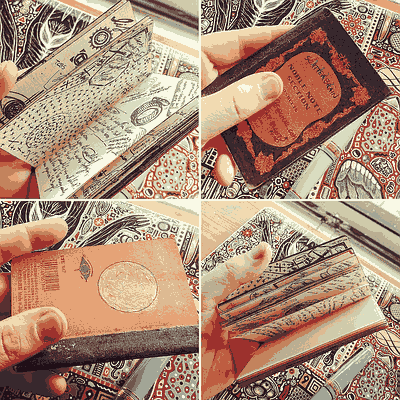
Onto my main notebook - this is the "professional" one. Accounts from conferences, meetings, to-do, blog ideas, research ideas, explorations, diagrams and so on.
Realistically, I carry this with me most of the time as well, as it's in my bag/purse/backpack depending on how I styled myself that day/week/month, but not say if I'm going out with friends or when I explicitly want to disconnect from thinking about anything technical.
Again, post-it tricks, mostly for home or personal to-do stuff, and reverse-side - in this case dedicated to whatever is not about work, random ideas, trips, whatnot. I also happen to have some page markers of some sort, often - that I use to mark the pages that have blog ideas on.
Right now this notebook happens to be a "Traveler's notebook super lightweight paper", plain, staple bound, which I think is a limited edition I found at Maido (a San Francisco stationery store in Japantown).

It's actually quite impractical as the paper is so thin (but sturdy, has no problems with my fountain pens) it becomes extremely see-through, so I just decided to write only on the front page of each sheet, and this works because the back of each new page sits always on blank pages, so it's all perfectly pure white. It will give me some troubles when I scan it though... but that's for later.
As I like to carry this notebook around, I usually go for formats around A5. As I like to experiment with different kinds of paper and ink, I also prefer notebooks that have not too many sheets, so I get to change them more often!
Another trick I've been practicing for a few years now I think is that I glue the last page of this "main" notebook to the back cover, along two sides, i.e. leaving the top open. It becomes a handy "pocket" for storage!
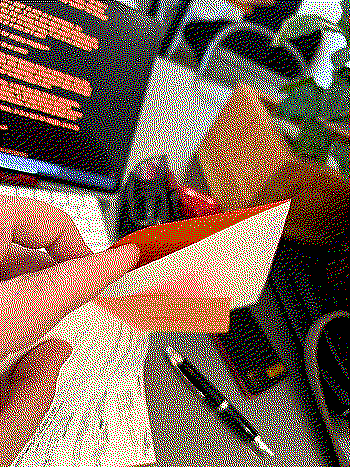
Lastly! I typically have... paper at work as a scratchpad, for calculations, doodles and so on. I don't care about this notepad at all, again you might notice how I'm playing tricks with myself to maximize my happiness... As I dedicated it to random crap, I use it as often as I want, and making as much of a mess as I want!
Tools for thought. And for purging thoughts.
Why do we take notes? Why do we write?
If you think you are writing notes because years or months down the line you will go back and have all this fantastic reference for you, I can tell you, I've almost never seen that happening, not to myself (and I have kept pretty much all my notes), nor to most people I know.
Writing helps me in two ways. First, it is a tool for thought, it is the best form of rapid prototyping, and I really don't think it can be replaced for that.
It works both because going through the process of explaining something helps you realize issues there are with ideas, and because it effectively adds an external memory to your brain/thoughts.
Moreover, the visual natural, the ability to mix drawings with text, it is all obviously powerful, I don't think anyone would debate that.
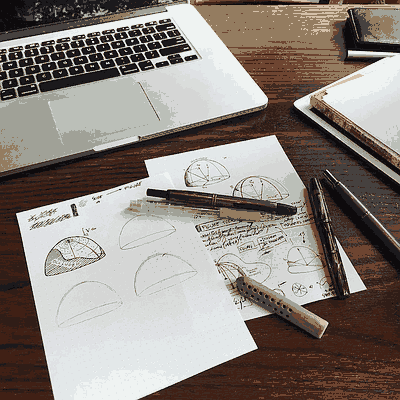 Some illustrations for a Siggraph presentation (GTAO).
Some illustrations for a Siggraph presentation (GTAO).And that's also one reason why I am somewhat particular about it - again, not in a "it must be this way" sense, but in the sense that seemingly minor issues with certain technological solutions are in practice fairly big, at least for me, when it comes to something that I don't use only occasionally, leisurely.
The second aspect that I found to be key, is the offloading of thoughts.
As I said, I believe that writing is not for safe keeping. I could say the same for photography, collections of digital files and so on. Safe-keeping is mostly an illusion.
But it is a good illusion, it is nice to know what we captured is safe - even if, or especially because, we won't ever go back to it. It's the pensive in Harry Potter, on a day when CGI artists are on strike.
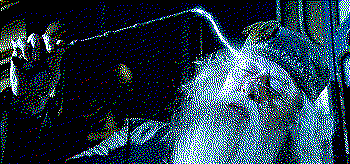
For example, an important thing I found works for me is to keep a page, typically the first of the "reverse" side, for what I call "lust and release". Crap I like, and I like researching about, and I could buy... but that I don't really want to buy, because of my afore-mentioned aversion to "too much crap" for some level of "too much". This page allows me to do all the browsing, then when I found what I'd really like, maybe a watch, a camera, a pen, a vintage computer, some fashion... I write it down and let it go. Sometimes I eventually come back and buy it, but it's a tiny fraction of what I've noted down over the years...

This illusion of permanence is also why I never cared about cataloguing my notes in sophisticated ways. Again, I tried lots of things over the years, even wrote my own note taking apps, never found value in them.
What I do is, when I finish a notebook, to simply take photos of each page with my phone, put them on the cloud "just in case" I need to go back to them (practically never happens), and that's it. All the comfort of a permanent catalog, with zero complexity.
Even when I write digitally, I use plain text files, either on the cloud or on my usb stick (there is some method to all that too, of course), and nothing of that is very important to me - these text files, like the one I'm writing right this moment, are just temporary forms of something that will be published somewhere and can then be deleted, either, as in this case, for my blog, or presentations, articles and so on.
I have a similar low-tech/effort strategy for my backups as well, but that's a story for another day...
I mentioned carrying two pens. A great pleasure of fountain pens is that you get to play with inks! I have a... not insignificant collection of both, so I change often, and I like having two ink choices with me, usually. One is fine, but two allow for some contrast, sometimes for highlighting but most often just because I swap them between tasks, as I write in fairly small lettering, a page might contain notes for various topics, and it just look nice to me to alternate.
Some equipment reccomendations.
Ok, now that you know much more that you wanted or needed, if any of what you read is appealing and want some starting points into the fountain pen world - here are a couple of tips:
- Best cheap pen: Lamy Safari. There is really nothing else comparable at the price. Being an European pen, the nibs will write bolder, for a given marked size, than Japanese. Also, Lamy nibs have a relatively wide variance from the factory, so just try them and pick what feels and looks nice.
- Best mid-price pens: Pilot vanishing point or anything Sailor. I used to say that the Pilot are the best "writers" I ever found, and I still rank them among the top (if your hand is ok with the clip placement) - but I have found Sailor nibs to be even better. I like fine and extrafine, perhaps there are other brands that might be better for people who like bolder weights.
- Best notebook: Can't name a brand as there are many that are excellent, but go with some fountain-pen friendly paper (smooth, non feathering/see-through, but absorbent enough not to cause the ink to never dry), I like either plain or a dot-grid because I take free form notes intermixed with drawings, and as I said, I prefer something smaller and with not too many sheets, so I can change! Also, the absolute best would be a spiral-bound notebook with a hard back and small spirals, this is because it will always open flat with no effort, and can be folded open at any page, with the hard backing to be able to jot down notes when you have no desk (e.g. if you end up standing in a crowded room). But with thin notebook the bounding method does not matter much to be honest. Rhodia is a safe bet.
- Best ink: Again, too many. But if you are new to the world of pens and inks, start with something safe, that flows very well and dries fast, does not feather, fade or streak. Avoid too fancy inks, typically inks from pen manufacturing brands are better behaved than inks from brands that want to sell crazy colors, sheens, special effects and so on. You probably want to have at least one simple, black-black. Aurora black is great, the Platinum black carbon-based is amazing as well, but as I said, a ton of choice, even "simple" Lamy inks are amazing.
Appendix:
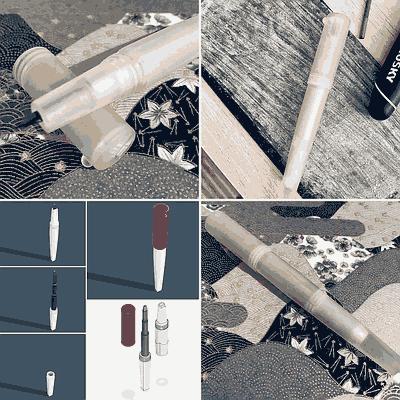 A 3d printed shell for the Vanishing Point cartridge I made...
A 3d printed shell for the Vanishing Point cartridge I made...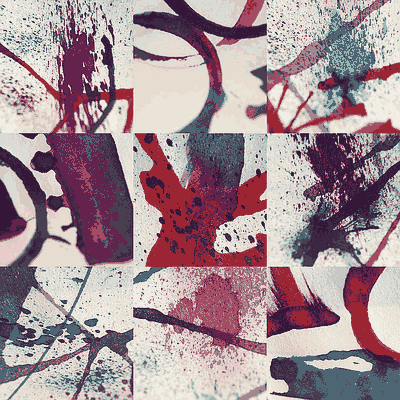 Inks is where the fun is!
Inks is where the fun is!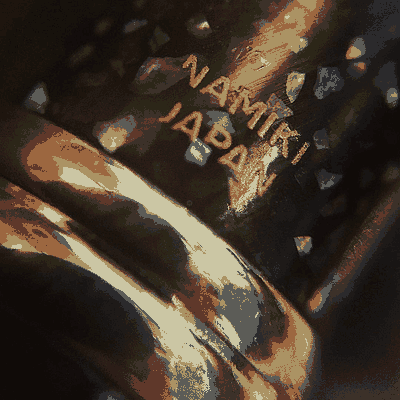 A detail of one of my Vanishing Points. Raden inlays.
A detail of one of my Vanishing Points. Raden inlays.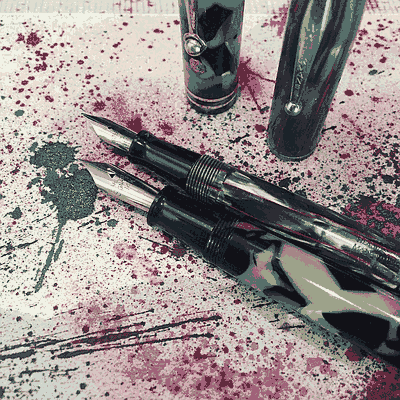 Vintage pens can be even less practical than regular FPs, but are the only way to try proper flex nibs.
Vintage pens can be even less practical than regular FPs, but are the only way to try proper flex nibs.

